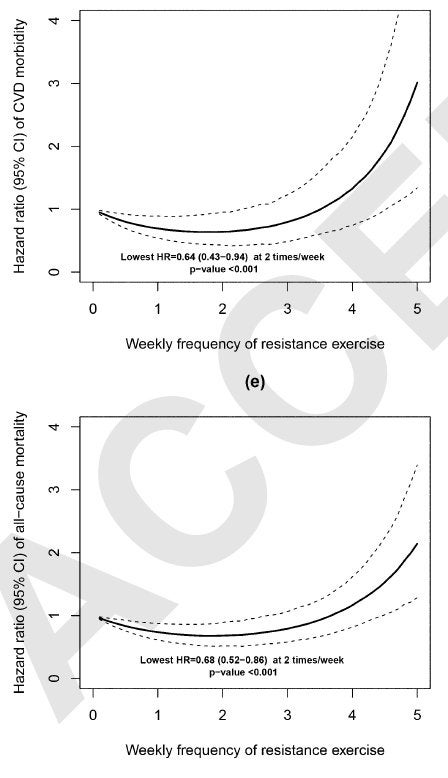There are two very different headline messages that I could have chosen for this article. One is that even a very modest amount of strength training can dramatically lower your risk of fatal heart disease. The other is that too much strength training will dramatically raise your risk of fatal heart disease. Perhaps both messages are true. Or perhaps neither are. I’ll let you be the judge.
The study in question is in Medicine & Science in Sports & Exercise, from a team of researchers led by Duck-chul Lee of Iowa State University. It’s an analysis of data from 12,500 patients who received medical examinations at the Cooper Clinic in Dallas between 1987 and 2006. Among the questions these patients answered was how often and for long they performed resistance training each week. The study tried to figure out if, after accounting for various other factors like health conditions and other forms of exercise, the amount of resistance training the subjects did could predict how likely they were to suffer a serious cardiac event, die of a heart-related condition, or die of other causes during the study.
If you followed the “too much running” a few years ago, this setup may sound vaguely familiar. In fact, this Cooper Clinic cohort is the same one Lee and his colleagues studied to ask exactly the same question about aerobic training. Their initial results, at a conference in 2012, suggested that the health benefits of aerobic exercise disappear if you run more than about 20 miles per week—and, as co-authored by one of the researchers put it, that “running too fast, too far, and for too many years may speed one’s progress towards the finish line of life.” That was a message the media .
But as time went on, there was push-back, both from and from who criticized some of the statistical techniques used to analyze the data. The fact is that the people who report habits like running every day tend to be different from non-runners in many ways, ranging from weight and cholesterol levels to psychological outlook and socioeconomic background. The statistical techniques used to account for these differences aren’t perfect, so the results need to be interpreted with caution. Perhaps as a result of this pushback, when the aerobic exercise analysis was finally published in a peer-reviewed journal in 2014, the researchers the “even a little bit is good” message rather than the “too much is bad.”
So, with that preamble, what did the data say about resistance training? It was surprisingly similar. Of the 12,500 subjects, about 3,500 reported doing some resistance training; after adjusting for age, sex, and other factors, those who did any amount of resistance training were 55 percent less likely to suffer a serious cardiac event during the study. That’s great news. Even better is that it doesn’t take much. The study’s main conclusion is that even one session or less than an hour a week of resistance training reduced the risk of cardiac events and death from all causes during the study, no matter how much (or how little) aerobic exercise the subjects were also doing.
But if you look more closely, you see that the picture changes as you start doing resistance exercise more frequently. The lowest risks seem to accrue to those working out twice a week, and by the time you get to four workouts a week, you’re no better off than those not working out at all. And if you extrapolate to five days a week, it looks like you’re about three times as likely to suffer a stroke or heart attack and twice as likely to die of any cause during the study.
Here’s what those curves look like. In the top graph, CVD morbidity is the risk of suffering a stroke or heart attack compared to those doing no resistance exercise; all-cause mortality is the risk of dying:

It’s not hard to come up with a plausible explanation for why too much strength training might be bad for your cardiovascular system. There’s that strength training may contribute to stiffening your arteries, which could result in more cardiac problems. Bolstered by this new data set, it would be easy to write that headline.
But I’m hesitant. I find it curious that this particular data set has produced very similar patterns for the response to both aerobic and resistance exercise. It may be that moderation in all things really is best and doing too much—more than a few times a week—takes a potentially fatal toll on your body. But it may also be that the particular group of people referred to the Cooper Clinic, combined with the particular statistical manipulations needed to massage away the many differences between daily exercisers and non-exercisers, produce some sort of spurious pattern.
It’s telling, to me, that other data sets have found more or less the opposite. The National Runners’ Health Study, for example, found up to 40 miles per week and beyond in a sample of 35,000 runners. And I recently wrote about a study of 122,000 people which found that those with “elite” levels of aerobic fitness lived longer than those with mere “high” levels.
I wish I could wrap things up with a tidy bow and confidently proclaim which results are right and which are wrong. Unfortunately, it’s not that simple. But these new results, suggesting that hitting the gym three times a week is somehow worse for you than hitting it twice a week, bolster my suspicions that there’s something funny going on with the results—and by extension, something funny with the earlier conclusions about aerobic exercise. On the plus side, I can be a little more dispassionate about the findings this time, because the truth is that I rarely, if ever, manage to do resistance training more than twice a week. I’d love to think that puts me in some sort of magical sweet spot. But I’m not convinced.
My new book, , with a foreword by Malcolm Gladwell, is now available. For more, join me on and , and sign up for the Sweat Science .


